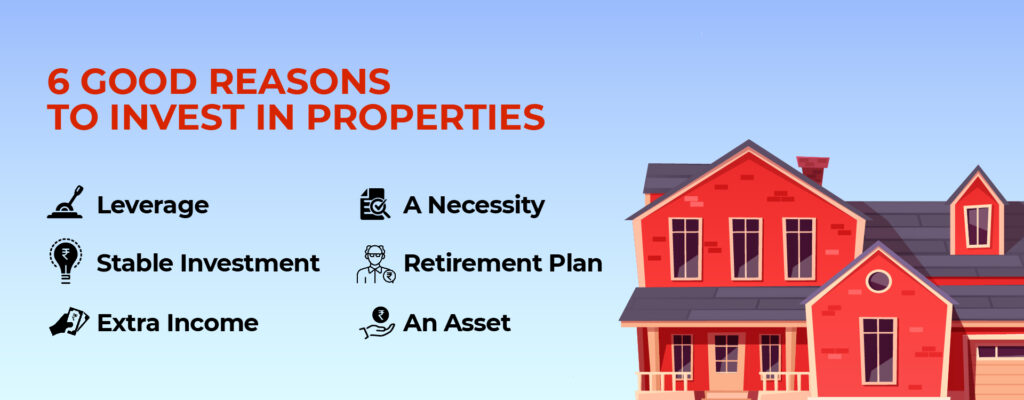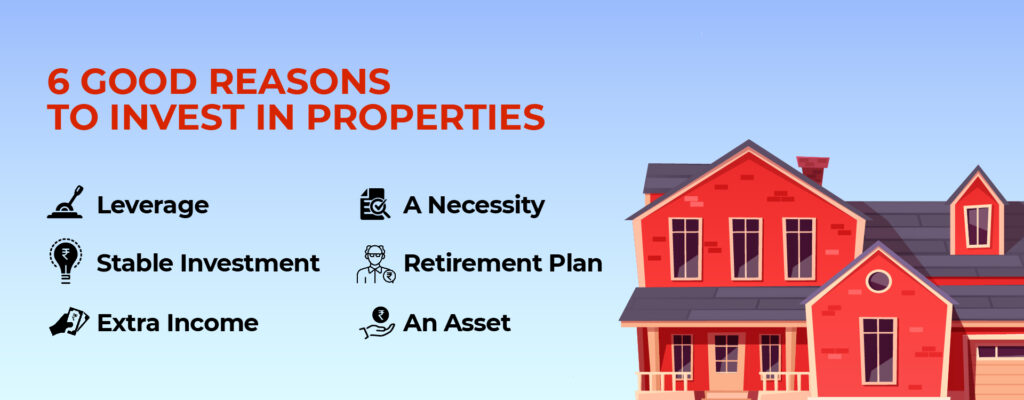Real estate is a part of your property that consists of land and the buildings on it. It also includes natural resources such as crops, minerals or water; immovable property of this nature; an item of real property like buildings or housing. Real estate involves property, land, buildings, air rights above the land and underground rights below the land. The term real estate itself means real, or physical, property. Real estate is different from personal property. Personal property is not permanently attached to the land, such as vehicles, boats, jewellery, furniture, tools and the rolling stock of an agricultural farm.
Examples of Real Estate
Several examples fall under the ambit of real estate. Each of these differs in definitions in terms of size and type of property.
- Single-family dwelling: A house designed for only one family
- Multi-family dwelling: A group of houses designed for more than one family like a housing society
- Attached: Any unit that’s connected to another unit and is not a separate dwelling
- Apartment: An individual unit in a multi-unit building. The boundary limits are set by doors and walls and differ in the number of rooms and floor space. For instance: multi-story apartment buildings. The size of an apartment or house can be described in square feet or meters. In some countries it counts only living space and excludes other non-living spaces while in other places like Europe it reflects the total area of the walls enclosing the home, thus including any attached garage and non-living spaces.
- Multi-family house: Multi-story detached buildings where, unlike flats where there is more than one unit on each floor, these houses have a separate apartment or unit on each floor.
- Terraced house: Several single or multi-unit buildings in a continuous row with shared walls and no intervening space. For example townhouses or row houses.
- Condominium (Condo): A building with individual units owned by individual people. Common grounds and common areas within the complex are owned and shared jointly.
- Detached house: A free-standing building not connecting to anything else. For example a small bungalow.
- Portable house: Houses that can be moved on a flatbed truck
- Mobile home: A vehicle on wheels that has a permanent residence attached to it
- Hut: A dwelling typically made of raw materials such as bamboo, mud, and clay. For example kaccha houses in Indian chawls and village areas. They are also found in urban poor areas.
- Cooperative: A type of multiple ownership in which the residents of a multi-unit housing complex own shares in the cooperative corporation that owns the property, giving each resident the right to occupy a specific apartment or unit.
- A studio apartment has a single bedroom with no living room with a tiny separate kitchen.
- A one-bedroom apartment has a living or dining room separate from the bedroom. Two bedrooms, three-bedroom, and larger units are common.
- Other categories include Chawls, Villas, Havelis whose size is usually measured in Gaz (square yards), Quila, Marla, Beegha, and acre.
Characteristics of Real Estate
Immobility: The geographic location of any piece of land can never be changed. It remains the same forever. You can alter the topography, you can move the things on the land sometimes like turning farms into houses or houses into farms but the location remains the same. You cannot transport land.
Indestructibility. The land is durable and indestructible. It can lose its quality due to soil erosion or water pollution or even during floods and landslide but the piece of land remains intact even after the storm passes.
Location or area preference. Location is the most important economic characteristic of the land. People have choices and tastes when it comes to a given area which is called location. They base their location preferences on factors like reputation, proximity to work, convenience, etc.
Scarcity: The total supply of land is fixed and cannot be changed. It is a resource that cannot be created by technology or produced artificially. We have a limited supply of land.
Improvements: Private nature improvements like homes and fences are referred to as improvements on the land while on the other hand improvements like sidewalks and sewer systems which fall under public nature are called improvements to the land. Both of these add value to the property.
The permanence of investment: Improvements like drainage, electricity, water, and sewer systems can’t be removed or replaced economically and thus remain constant.

‘‘
Real estate is different from personal property. Personal property is not permanently attached to the land, such as vehicles, boats, jewellery, furniture, tools and the rolling stock of an agricultural farm.
Four Types of Real Estate:
Residential real estate: Includes new construction and resale homes. The most common category is single-family homes. There are also condominiums, co-ops, townhouses, duplexes, triple-deckers, quadplexes, high-value homes, multi-generational and vacation homes.
Commercial real estate: Property for commercial purposes like shopping centres and strip malls, medical and educational buildings, hotels and offices. Apartment buildings are often considered commercials as they mass produce homes to produce income.
Industrial real estate: Includes manufacturing buildings and property, as well as warehouses. The buildings can be used for research, production, storage, and distribution of goods.
Land: Consists of vacant land, working farms, and ranches. The subcategories within vacant land include undeveloped, early development or reuse, subdivision and site assembly.
Real Estate Industry
The real estate market involves producing, buying and selling real estate. By producing we mean building houses, apartments, factories and putting them on sale with the added value. Several people participate in the real estate market as a business opportunity and several others engage in it for their own homes. Real estate affects the economy by being a critical driver of economic growth. The construction of new buildings is a component of gross domestic product. It includes residential, commercial, and industrial buildings. Indian real estate sector has witnessed high growth in recent times with a rise in demand for office as well as residential spaces. Real estate attracted around Rs. 43,780 crore (US$ 6.26 billion) in investment in 2019.
Real estate agents are experts who assist homeowners, businesses and investors in buying and selling properties. Sellers’ agents help them find buyers and price your property, using comparative listings of recently sold properties in the market. They assist in negotiations with the buyer, helping you get the highest price possible.
Buyers’ agents are well researched on the local market and provide similar services for the home purchaser to find a property that meets the buyer’s criteria. Buyers’ agents negotiate prices, help with the legalities of the process, etc.
If you choose to invest or venture into the real estate market, make sure you read up on current market prices and trends, follow up on booms and blows in the sector and make well-researched choices. Depending solely on brokers or agents may not always be the smart choice as they might take advantage of you.

‘‘
Real estate affects the economy by being a critical driver of economic growth. The construction of new buildings is a component of gross domestic product.
Real Estate Investing
Anyone who buys or sells a home is engaging in real estate investing. Several questions pop into one’s mind like will the house rise or fall in value while you live in it? How will future interest rates and tax affect you if you get a mortgage?
There are several ways to invest in real estate and several people take it up as a successful business. Some of the most common ways to invest directly include:
- Homeownership
- Rental properties
- House flipping
Flipping a house involves the purchase of a house to improve then sell it. Rentals include buying houses but letting other people stay in them for a fixed amount per year/month. Many people own several homes and rent them out. Nowadays several investors use Airbnb as a convenient way to rent out all or part of their homes especially for converting their homes into vacation houses in tourist areas. You can make money in two different ways: Revenue from rent or leases, and appreciation of the real estate’s value.
Investing in the real estate business has lots of long term gains unless the prices hike too much and the bubble bursts like the US crisis which started with the real estate boom. Factors such as employment rates, the local economy, crime rates, transportation facilities, school quality, municipal services, and property taxes can drive real estate prices up or down. This is why you must be aware of where we are in the current business cycle. It can be extremely risky to start if the chances are that the real estate market is going to crash.
Advantages
- Offers steady income
- Offers capital appreciation
- Diversified portfolio
Disadvantages
- Is usually illiquid
- Influenced by highly local factors
- Requires big initial capital outlay
Indirect Investment in Real Estate
One can invest in housing without buying a home by purchasing stocks of homebuilders. Their stock prices rise and fall with the housing market. Another way is with Real Estate Investment Trusts, called REITs in commercial real estate. These are companies that hold a portfolio of income-producing real estate.
There are several broad types of REITs, including equity, mortgage, and hybrid REITs and they also classify based on how their shares are bought and sold as Publicly traded REITs, Public non-traded REITs and Private REITs. Their stock prices lag behind trends in residential real estate by a few years. You earn income from REITs through dividend payments and appreciation of the shares. You can also invest in real estate mutual funds and real estate exchange-traded funds. REITs are very liquid and transparent as the shares trade like any other security traded.




